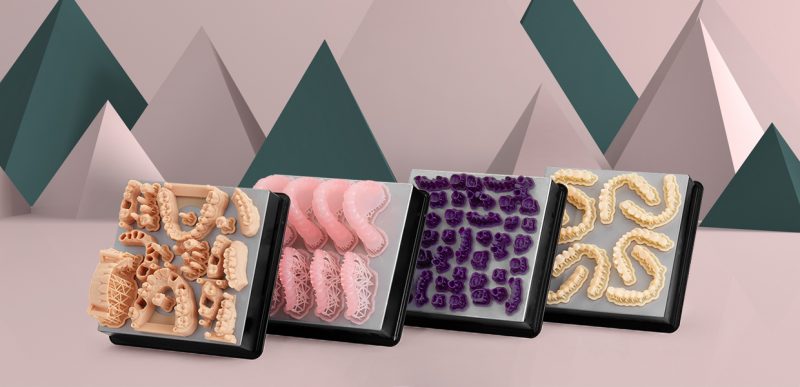3D Printing Resins in Dentistry: An Entire Guide for Dentists

Have you seen how 3D printing has rapidly become an integral part of daily dentistry? From models and dentures to crowns and surgical guides, digital dentistry is revolutionizing the way we practice. But here’s the truth: the magic isn’t in the printer. It’s in the resins.
The 3D printing resin you use may determine whether your finished product is accurate, beautiful, and long-lasting or a do-over in disguise. Let’s dive deep into the various types of dental resins, how they’re applied, and some helpful tips every dentist should be aware of.

-
Permanent Crown Resin
For long-lasting restorations, this is your go-to.
- Strength & Accuracy: Provides durable, consistent restorations with a tight fit.
- Stability: Resistant to plaque, wear, and discoloration.
- Applications: Single crowns, veneers, inlays, onlays.
Tip for dentists: Permanent crown resin saves you from remakes, meaning happier patients and improved clinic efficiency.

-
Temporary CB Resin
We all know how much patients don’t like the “wait” for permanent restorations. That’s where temporary resins come in.
- Natural Shades: Available in tooth-like shades for aesthetics.
- Adaptability: Provides good marginal fit and functional strength.
- Applications: Temporary crowns, bridges, veneers, inlays, onlays.
Fun fact: Temporary resins are often the first “wow factor” experience for patients! They leave smiling the same day!

-
IBT (Indirect Bonding Tray) Resin
Orthodontists, this one’s for you.
- Precision Bracket Placement: Assists in bonding multiple brackets at once.
- Comfort: Saves chair time and stress to the patient.
- Applications: Indirect bonding trays.
Dentist insight: No more trial-and-error forever, IPR and bracket placements are quicker and more precise.

-
Model Resin
This is your “foundational resin.”
- High Precision: Ideal for diagnostic and working models.
- Applications: Crown & bridge models, implant models, aligner models, diagnostic models.
Tip: If you own a lab, model resins are your workhorse every day. They guarantee the accuracy of every next step.

-
Denture Base Resin & Denture Teeth Resin
Digital dentures are transforming lives literally.
- Cost-Effective: Cost-effective and time- saving for labs and clinics.
- Biocompatibility: Safe for long-term wearing.
- Applications: Try-in dentures and final dentures.
Fun fact: Did you know digital dentures reduce multiple patient visits to 2–3 appointments?

-
Surgical Guide Resin
Implantology is all about precision.
- Sterile & Safe: Autoclavable and biocompatible.
- Applications: Surgical guides, pilot drill guides, drilling templates, device sizing templates.
Tip for dentists: A surgical guide resin is like your GPS in implant surgery. It eliminates human error and increases confidence.

-
Custom Tray Resin
Goodbye to universal trays.
- Precision Fit: Custom trays improve impression accuracy.
- Biocompatibility: Intraoral safety.
- Applications: Implant, denture, crown & bridge cases.
Fun fact: A custom tray made well saves up to 40% of impression material!

-
Dental LT Clear Resin
When patients just want it to be transparent literally.
- Durability: Fracture-resistant and resistant to discoloration.
- Optical Clarity: Crystal clear finish.
- Applications: Occlusal splints, night guards, retainers.
Tip: Patients adore LT Clear resin because it’s almost invisible while safeguarding their teeth.

Why the Right Resin is Important
- Improved Patient Experience – Patients desire speed, comfort, and looks.
- Reputation of the Clinic – Quality equipment translates into fewer complaints and re-makes.
- Cost Savings – Right resin = less error = less wastage.
And the best thing is today’s dentists can purchase dental products online in India conveniently. Top websites such as Dentalkart (India’s best dental shop) consolidate all these dental materials under one umbrella.

Frequently Asked Questions (FAQs)
Q1. What resin is best for implants?
Surgical Guide Resin is the best for implants due to its autoclavability, biocompatibility, and accurate drill guidance.
Q2. Are 3D printing resins patient-safe?
Yes, dental resins are generally biocompatible and approved for intraoral use. Source them from reputable dental product suppliers at all times.
Q3. How long does a permanent crown resin last?
With good use, permanent crown resins are as long-lasting as traditional ceramics and can last several years.
Q4. Do resins need special storage?
Yes, keep resins in dark, cool areas to avoid premature curing. Always refer to the manufacturer’s recommendations.
Q5. Can small clinics afford 3D printing resins?
Absolutely! Even small practices enjoy the benefit because resins save chair time, eliminate lab reliance, and increase patient satisfaction.
Fun Facts About 3D Printing in Dentistry
- The first 3D-printed tooth was produced in 2012.
- Dental 3D printing is expected to expand into a multi-billion-dollar industry over the next several years.
- One aligner model can now be printed in less than an hour.
- 3D-printed dentures can be fabricated in only two patient visits.

Final Thoughts
3D printing resins are no longer just “optional” they’re essential tools for modern dental practice. Whether you’re crafting a permanent crown, fabricating a surgical guide, or designing clear aligner models, the right dental material makes all the difference.
And the bonus part? You don’t have to search through suppliers. You can now purchase dental products online in India from the Top dental store in India, where all sorts of resins and dental instruments are at your fingertips.
By adopting digital workflows and the proper resins, dentists are able to save time, reduce errors, and provide patients with quicker, more effective, and more esthetic outcomes.

No Comment